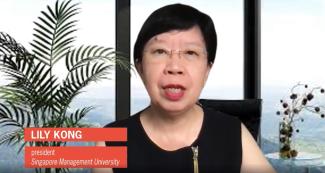
“Creativity can be nurtured but as with all things, it cannot be perfectly taught and perfectly learnt. We can create the environment for it and the encouragement to promote it,” said SMU President, Prof Lily Kong, at the Time Higher Education (THE) Asia Universities Summit on 1 June 2021.
She was speaking at a panel discussion titled, “How should universities work together to nurture creativity and innovation?”, which was part of the three-day virtual Summit attended by more than 600 university leaders, experts and representatives from the higher education sector.
Organised by THE in partnership with Japan’s Fujita Health University, the Summit was themed “Crossing Boundaries, Unlocking Creativity”. It brought together top university and industry leaders from around the world to exchange experiences and views in areas of research and innovation collaboration, to address common challenges.
In line with SMU Vision 2025’s strategic priority of "Growth in Asia", where the University seeks to share good practices and gain understanding of Asia’s economy, polity and society, Prof Kong was sharing her views on how creativity can be nurtured. She also elaborated on the factors that need to be considered to allow inventions to flourish and for innovation to follow. Prof Kong’s fellow panellists included Tsinghua University’s Vice President and Provost Prof Bin Yang; Nagoya University’s President, Prof Matsuo Seiichi; Seoul National University’s President Prof Se-jung Oh; and Kyoto University’s Executive Vice President Prof Norihiro Tokitoh.
“Creativity can be nurtured but as with all things, it cannot be perfectly taught and perfectly learnt, but we can create the environment for it and the encouragement to promote it,” said Prof Kong. She suggested a three-pronged approach to do so.
First, for students, Prof Kong advised them to pursue their interests and be open to try different things, experience different ways of teaching and learning, and to engage in different activities outside the classroom.
Second, Prof Kong stressed the importance for educators to provide an environment that would accept different ideas and failures, reward creativity and innovation, and not penalise mistakes or be fixated with the notion that there was only one right answer. She suggested that fellow educators be mindful not to overcrowd or over-structure the curriculum. Instead, provide students with autonomy and choices, as well as opportunities to make connections across domains of knowledge by embracing multi- and inter-disciplinary studies.
“In SMU, we created the SMU-X pedagogy, which allows students to work with real-world challenges that require real-world solutions. This type of interactive and discursive learning encourages debates and discussions instead of one-way communication,” shared Prof Kong.
Third, she commented that it was equally important to create ecosystems to support innovation and entrepreneurship through activities, such as business competitions, mentorship and venture fund programmes so that students could benefit from such exposure. International partnerships among universities would add another dimension towards nurturing creativity and innovation by expanding such ecosystems and providing extended opportunities for students. Concurring, Prof Yang Bin, Tsinghua University’s Vice President and Provost, commented that international partnerships is a key factor that could help to mitigate physical boundaries, disciplinary barriers and technological limitations among universities.
Responding to a question on how to apply innovations in teaching and learning, Prof Kong commented, “Innovation and creativity goes well beyond scientific innovations and it really should reflect on our teaching and our approach to curriculum and pedagogy… in terms of our contributions to research-led innovations, we need to think not just in terms of scientific research but also in terms of business processes and business models.”
She elaborated on SMU’s experience in offering the Politics, Law and Economics (PLE) major, instead of the more conventional Philosophy, Politics and Economics (PPE) combination, as well as experiential learning in overseas through SMU-XO courses. These examples demonstrated how curriculum and pedagogy ought to innovate to meet the evolving needs of society and the economy.
The university leaders also exchanged perspectives on the most effective form of educational models and institutional partnerships to support fundamental research and foster greater collaborations. THE’s Chief Knowledge Officer, Phil Baty, moderated the hour-long discourse.
